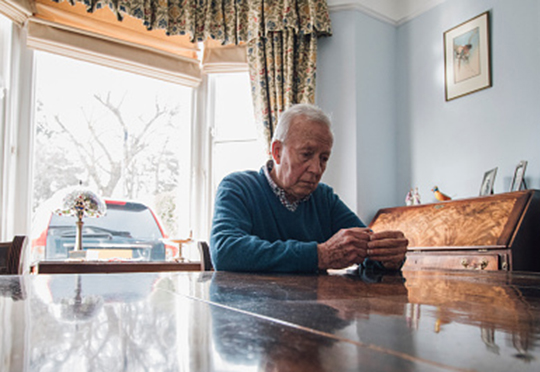Elizabethtown College was chosen, this past fall, as one of 21 higher ed  institutions to receive an AARP-funded Council of Independent Colleges (CIC) grant. More than 100 institutions applied.
institutions to receive an AARP-funded Council of Independent Colleges (CIC) grant. More than 100 institutions applied.
AARP, the nonprofit, nonpartisan organization dedicated to helping  people 50 and older to improve their quality of life, developed the grant to help identify and serve the needs—hunger, housing, income generation, social isolation—of older adults in college and university communities.
people 50 and older to improve their quality of life, developed the grant to help identify and serve the needs—hunger, housing, income generation, social isolation—of older adults in college and university communities.
The $13,000 “Intergenerational Connections: Students Serving Older Adults” grant also focuses on helping college students develop new skills and knowledge; increase retention through service learning; and develop a national network that recognizes the mutual benefits of intergenerational connections.
“This aligned with what we were already looking at for the Center for Community and Civic Engagement,” said Joel Janisewski, director of the College Center. “It was an area we were already invested in.”
As the College previously had a partnership in place, it worked with The Factory Ministries, in Paradise, Pennsylvania, a hub for connecting needs and resources in eastern Lancaster County. “Early on in the project we focused on social isolation, with income generation project work coming later,” Janisewski said.
Together, the organizations connected interested students with lower-income, older adults in the rural community. After a brief meeting, the attendees paired off on their own based on common ground. Then, over several visits to the older adults’ homes or other locations, the partners worked on life narratives. They spent a total of seven hours in conversation, Janisewski said. “This developed a deeper kind of relationship.”
The interaction, he said, connects well to the College’s “Life Span and Aging” coursework and to social work, psychology and occupational therapy majors, but there has been interest from students in international business, business administration, biology and engineering, as well.
Audrey Shultz, a junior engineering major, heard about the program last semester from Janisewski.
“I love being able to help people and the way the project was described to me; I would be able to get to know someone from Lancaster County and be able to help them live better day to day. The funny thing is that I thought that this project was purely volunteer, so it was nice to find out we would get a stipend,” Shultz said.
The stipend, which covers the travel costs and student compensation, comes from the AARP grant.
As Shultz and her program partner learned to know one another, “something just clicked,” Shultz said. “We got really close and got to know about each other’s personal lives. We still talk, and I am looking forward to working with her again this semester.”
Shultz said the two met at Starbucks. “We discussed her life,” Shultz said. “We talked through her childhood, teens and her adult life. (She) is such a great person and reminds me a lot of my own mother, which helped us to connect on a more personal level.”
Shultz said her take-home message of the first part of this project is that everyone needs more compassion and understanding.
“You begin to realize that the older people in our society were our age once, too. It makes it a little easier to relate. … I feel as though we, as a generation, are losing our relationships with the older folks in our lives. This project is a great way to bring that back.”
Janisewski said the first goal for the initial seven partners in this pilot program was to get to know each other for at least six hours, but several of the students, finding a true connection with their partners, ended up spending more time than required.
The second goal of the grant is to assist older adults with technical and computer-related skills, which, Janisewski said, can run the gamut. “Some begin at square one; some worked in the IT and tech industry,” he said. “It’s driven by the need of the partner.”
One community member, who is an artist, he said, was looking to set up a website to sell her artwork.
Marilyn Weaver, a self-sufficiency advocate with The Factory, said she is “personally passionate about connecting relationships across generations” and is pleased with the interaction of the students and seniors as they get to know one another. “It’s interesting for me to see the impact.”
Though the grant is just through May 2018, the College can apply, again, for the next academic year to continue the momentum, Janisewski said, noting that he is currently recruiting students for the spring semester.
“We’d like to develop ways for the students to build more focus, especially locally focused,” Janisewski said. “We want to connect to the community we are part of.”

